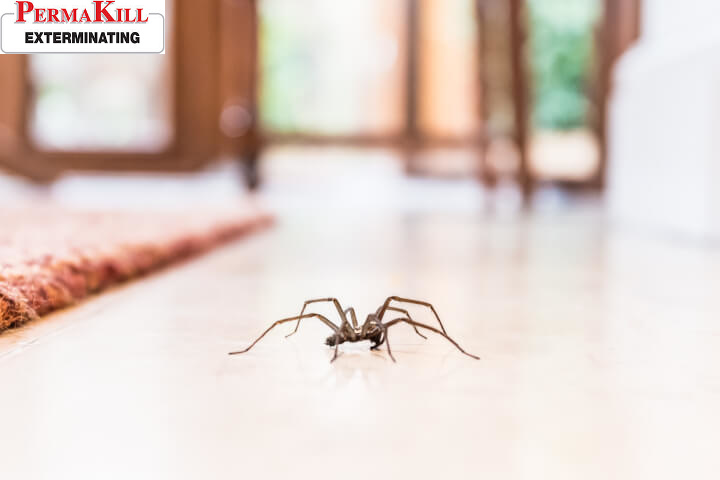


Spillage from a sugary drink or food left on the ground may not seem like much to worry about, but these can result in pest problems. Pests are usually attracted to the food and beverages that we consume. Even the smallest of crumbs is enough to draw foraging insects.
Having these pests around can cause a more serious problem, including a spider infestation. How come? Spiders are most attracted to other pests which they feed on.
What are the other factors that invite spiders? You might not know, but you often have it in your home or unconsciously do it. We gathered a list to help you avoid mistakes and reduce the odds that spiders infiltrate your personal space.
Almost all spiders are predators. They consume flies, mosquitoes, roaches, earwigs, and clothes moths. So if these pests are prevalent in your home, expect spiders to lurk around and build nests.
Unlike other pests that come into our houses during the winter periods to search for a warm place to shelter, spiders aren’t drawn to warmth because they’re "cold-blooded." Nevertheless, the brown recluse spider is an exemption.
This shy intruder prefers to hide in dark, dry, and warm places where humans don’t stay. They can be found in stored stuff such as bedding, clothing, shoes, and decorations. These items are frequently stored in wood, cardboard, or plastic containers.
Spiders don't need much water to survive, but they do drink water. Spiders normally get water from their prey, however, these annoying pests can also drink water from the morning and evening dew and the collected puddles of water, among others. If they sense that sink taps or bathtubs have water in them, they frequent them. To keep spiders away, avoid leaving any sources.
Just like every other living creature, spiders seek shelter. If you have recyclables, storage boxes, unused bags, and piles of papers stacked in your home, there’s a high chance spiders will move in. As much as possible, keep these items away from walls and off the floor to reduce the probability of a spider attack.
Avoid storing boxes or bags beneath your bed, as the last thing you want is a wayward spider crawling up onto your sheets.
Spiders are attracted to light. Therefore, if your house has lamps or other types of illumination such as computer screens located by doorways or windows, transfer them. Otherwise, spiders will be inclined to stay indoors toward these visible lights and live in your home. It will also help to keep the porch light off unless it’s necessary to have it on.
Rather than leaving your porch light on all night, connect a motion-sensitive light that illuminates when people pass by. This way, you won't have a consistent source of light in your yard that attracts spiders.
Spiders are watchful for small spots as these are areas where they can enter your home, so gaps in the caulk around windows, lost door sweeps, and cracks can be inviting for these unwelcome guests.
But there's an easy solution: Check all your door seals, especially on the bottom of the door, window seals and screens, and even your HVAC system to make sure there aren’t any chances for the pests to get in.
Spiders attract their kind when mating. This is because spiders have sound rituals when they mate. So the more spiders you have in your place, the more mating happens, drawing more arachnids.
It's a fact that pests are attracted to food and waste. If a garbage can isn't thrown out regularly, insect pests are sure to forage. As spiders' natural prey, they then draw the eight-legged creature to lurk around. To lessen the chance of being invaded by the arthropods, make sure to dispose of garbage properly.
Cannibalism among spiders also happens. Spider species such as the daddy longlegs spider also enjoy preying not just on insects but also species of their kind. Therefore, leaving spiders at home as a natural method of pest control doesn't necessarily equate to fewer spiders.
It’s totally possible for you to catch a spider crawling out of your favorite fruit, and the worst thing is that venomous spiders normally hide inside them. Regularly check and take a good look at the items you put in the shopping bag. Moreover, make sure to dispose of overripe fruits at the kitchen table and pick up fallen fruits from the trees, which attract fruit flies, fungus gnats, and other flying insects that spiders love to eat.
Kitchen appliances like stoves, microwaves, and toaster ovens usually have food particles that are left over after use. These draw common household pests in your kitchen, which in turn attracts spiders. Moreover, since the kitchen is where you prepare and cook food, pests can pose various health risks for you and your family.
Pests can spread dangerous bacteria like Salmonella and E. coli through contact with kitchen surfaces and their urine and droppings, which can contaminate food.
One of the more obvious lures for spiders is sticky traps or glue traps. If you wish to attract the creepy crawlies yourself, try using a glue trap that contains pheromones. Once the spiders get their legs on the scented or perfumed surface, it gets them stuck, eventually killing them.
A spider infestation is bound to happen if you continue to entice spiders into your home. The most common house spiders that usually inhabit residential properties are the common house spider species: cellar spider, wolf spider, hobo spider, cobweb spider, yellow sac spider, and jumping spider. Some species are venomous while they’re harmless, including the notoriously aggressive black widow spider and brown recluse spider.
Consider these measures to prevent spider population in your home:
Cluttered spaces make the best hiding places for spiders. To prevent a spider problem in your home, make sure to maintain regular tidying, cleaning, and decluttering. Outdoor areas that require your immediate attention would be porches, sheds, and garages. Inside, spiders usually creep underneath stairs, closets, storages, light fixtures, basements, and bathrooms.
Make sure to dust, sweep, and vacuum areas that are highly favored by these pests. In addition, you must remove spider eggs and spider web as soon as you see them to prevent spiders from invading.
Spiders will always see a way to get inside your home. One of your first steps to spider control is by moving anything that they’d likely hide in away from any exterior walls. Inspect door openings and window sills for any cracks that spiders could crawl through and seal these with caulk.
Also, repair torn window screens and cover vents and chimneys with a good mesh. When trying to repel and kill spiders, it's important to discover how they enter the home.
Many plant varieties have a strong scent that wards off spiders. Plants like basil, lavender, mint, marigold, chrysanthemum, eucalyptus, and dill have potent properties that send spiders away in another direction.
Aside from being a non-toxic spider repellent, they can also make your garden more attractive and different varieties are also easy to maintain inside the home.
One of the best ways to repel spiders is by using diatomaceous earth (DE). Spray a thin layer of DE on any spaces spiders linger. They’ll either walk over or ingest the substance. Although it feels like talcum powder to humans, DE is rough, and when spiders pass across the powder, it starts to jab and cut into their hard exoskeleton.
The wounds inflicted by the jagged diatomaceous earth cause the spiders to dry or lose all of the liquids and oils from their bodies, killing spiders instantly. If the spider ingests the diatomaceous earth, this will also cause it to perish. The male spider often roams around looking for food or a female spider who has still to moult to maturity.
Essential oils are one of the most proven spider repellents around. You can mix peppermint oil, lemon oil, tea tree oil, cedar oil, olive oil, or orange oil with water and put them into a spray bottle. Spray this mixture on the spider or spider egg sac. The more oils you apply, the more effective the spray will be.
Learn More: Plants That Repel Spiders

Spiders creeping around at home can be a nightmare. There are dangerous spider and poisonous spider species always ready to deliver an excruciating spider bite once disturbed. If you fear that these unwanted creatures are plaguing your home, it's best to call professional exterminators for help.
Get in touch with PermaKill Exterminating today to learn more about our safe and effective services. Working with PermaKill Exterminating isn’t just simply working with pest control experts. It also means you're teaming up with devoted home protectors. Schedule your free estimate now.